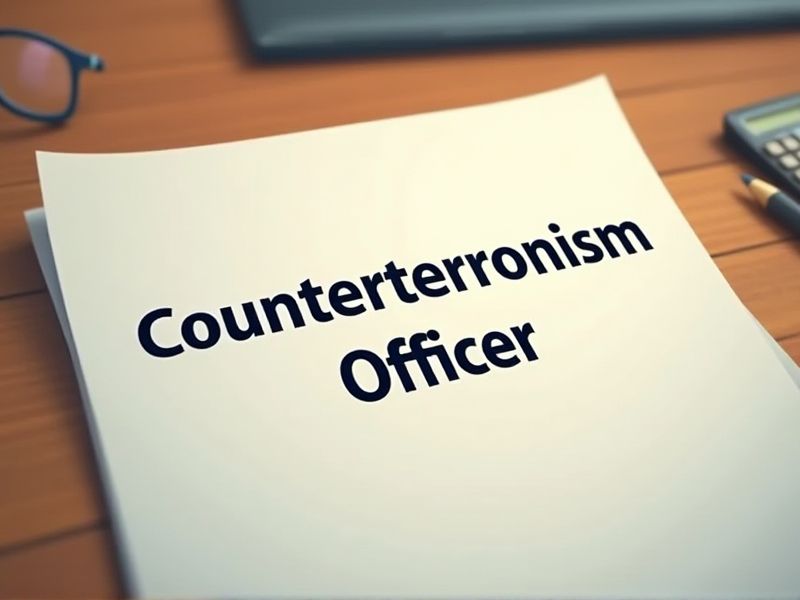
Counterterrorism Officers face complex and evolving threats that demand specialized skills and knowledge. Certain certifications enhance their ability to efficiently analyze and respond to terrorist activities, ensuring rapid and effective countermeasures. These credentials also provide officers with a deeper understanding of global terrorism trends and the latest counterterrorism techniques. Here are key certifications often required for a Counterterrorism Officer.
Certified Counterterrorism Professional (CCTP)
The CCTP certification provides standardized knowledge and skills essential for effective counterterrorism operations. Counterterrorism officers with CCTP credentials are more adept at identifying and mitigating potential threats. The certification enhances credibility and trust among agencies collaborating on sensitive missions. Possessing a CCTP can lead to more informed decision-making processes in high-pressure, risk-prone environments.
Certified Anti-Terrorism Specialist (CATS)
Certified Anti-Terrorism Specialist (CATS) provides critical skills for analyzing and managing terrorist threats, directly impacting the effectiveness of a Counterterrorism Officer. Training in CATS enhances situational awareness and equips officers with knowledge of global terrorism trends, allowing for responsive strategy adjustments. The certification emphasizes tactical communication and operational coordination, reducing the potential for security breaches. Specialized expertise gained through CATS ensures Counterterrorism Officers can efficiently implement advanced threat assessment and mitigation measures.
Certified Homeland Security Professional (CHSP)
The role of a Certified Homeland Security Professional (CHSP) ensures comprehensive knowledge in threat analysis, essential for a Counterterrorism Officer in identifying potential risks. Training as a CHSP equips individuals with strategic skills in emergency preparedness, crucial for preventing and responding to threats. This certification provides a framework for understanding national and international security protocols, vital for effective counterterrorism operations. The expertise gained through CHSP fosters interdisciplinary collaboration, enhancing the efficiency and coordination among teams involved in counterterrorism efforts.
Certified Intelligence Professional (CIP)
Certified Intelligence Professional (CIP) training equips counterterrorism officers with advanced analytical skills to evaluate complex security threats effectively. This certification ensures officers can integrate intelligence from diverse sources, enhancing strategic decision-making. With CIP, individuals improve in identifying and anticipating potential terrorist activities, providing a preemptive edge. The credibility and standardized knowledge gained enhance collaboration with other agencies, crucial for comprehensive threat management.
Certified Emergency Manager (CEM)
The Certified Emergency Manager (CEM) credential equips a Counterterrorism Officer with critical skills in emergency planning and crisis management, enhancing their ability to respond to complex terrorist threats effectively. CEM training provides access to a network of professionals, offering valuable insights and shared experiences that enrich counterterrorism strategies. Understanding inter-agency coordination, which is a core component of the CEM program, strengthens a Counterterrorism Officer's capability to collaborate with different entities during a terrorist incident. A CEM's emphasis on risk assessment and mitigation ensures that Counterterrorism Officers are better prepared to prevent and manage potential terrorist attacks.
Certified Crisis Manager (CCM)
A Certified Crisis Manager (CCM) enhances a Counterterrorism Officer's ability to effectively coordinate and manage high-stakes situations, reducing the risk of operational errors during terrorist incidents. The specialized training in crisis management equips them with the skills to anticipate potential threats and devise preemptive strategies, leading to a more resilient security posture. CCM certification provides structured frameworks that ensure the efficient communication and collaboration required across agencies during critical incidents. Counterterrorism Officers with CCM credentials can better analyze evolving situations and adapt their tactics to mitigate threats, thereby enhancing public safety.
Certified Protective Services Specialist (CPSS)
A Certified Protective Services Specialist (CPSS) provides specialized training crucial for counterterrorism officers, enhancing their ability to assess and mitigate threats effectively. This certification ensures that officers possess advanced skills in surveillance detection and risk management, directly contributing to more secure environments. Robust training in emergency response and protective tactics prepares these specialists to handle high-stress situations with precision. The CPSS certification often leads to improved coordination with other security forces, increasing overall counterterrorism efficacy.
Advanced Counterterrorism Operations Certification (ACOC)
The complex and evolving nature of global terrorism necessitates specialized knowledge, which the Advanced Counterterrorism Operations Certification (ACOC) provides, ensuring officers effectively respond to diverse threats. Enhanced analytical skills and strategic insights offered by the ACOC enable officers to anticipate potential terrorist activities, thus preventing potential attacks. This certification fosters collaboration between international agencies by establishing a standardized competency framework, promoting cohesive and coordinated counterterrorism efforts. The requirement of ACOC supports continuous professional development, ensuring officers remain current with the latest tools and techniques in counterterrorism operations.
Open Source Intelligence Certification (OSIC)
The Open Source Intelligence Certification equips counterterrorism officers with advanced skills to analyze publicly available information effectively. With increasing digital footprints, the certification helps officers identify potential threats faster by accessing social media, forums, and other open sources. Understanding and leveraging open-source intelligence enhances strategic decision-making in counterterrorism operations. The certification provides structured learning that aligns with evolving intelligence gathering techniques crucial for preempting terrorist activities.
Critical Incident Response Certification (CIRC)
Counterterrorism officers face unpredictable and high-pressure scenarios, necessitating specialized skills; CIRC equips them with the expertise needed to manage such critical events. The certification enhances decision-making efficiency by providing systematic frameworks and protocols. A standardized approach through CIRC ensures cohesive and coordinated responses during high-stake incidents. The rigorous training prepares officers to effectively mitigate risks and protect public safety.
Summary
With certifications, you can enhance your skills in identifying and assessing potential threats more accurately. This specialized training often leads to improved strategic planning and operational effectiveness in counterterrorism efforts. Such qualifications frequently result in increased credibility within your professional network and can provide career advancement opportunities. Your enhanced expertise can contribute significantly to more effective collaboration with law enforcement and intelligence agencies.
